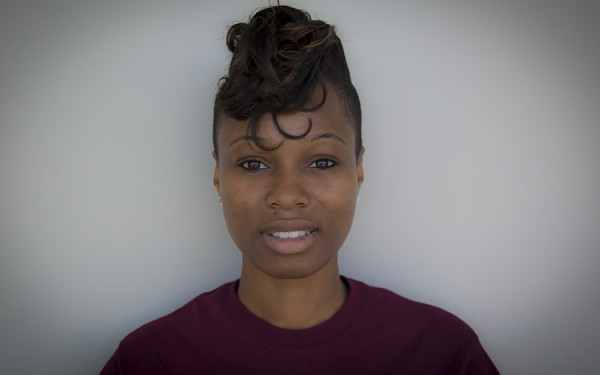Step Into the Oval
A Look Into the Women’s Roller Derby Scene in Montreal
It’s Saturday night in Montreal and sports fans are making their way to the arena. With a packed parking lot and long lines for tickets, the prospect of fast skating and hip checks is clearly enticing. It sounds like an average night at a Montreal Canadiens game, but it’s nowhere near as conventional.
A large gymnasium with an oval track at Le Taz Roulodome replaces an ice rink. There aren’t 20,000 plus fans but around 1000, made up of children, teenagers, young adults and families. When they aren’t cheering the competitors on, they’re making pyramids stacked with Pabst Blue Ribbon beer cans. The jersey names aren’t familiar ones like “Crosby,” “Subban” or “Ovechkin” but “Boobi Puncher,” “Falcon Punch” and “Rock E. Road.”
This is a night at a roller derby game, specifically, the first night of the Montreal Roller Derby League’s 2015 season. It’s the only female roller derby league in the city. The league features five teams—Les Contrabanditas, Les Filles du Roi, La Racaille, The New Skids on the Block and The Sexpos.
The league even hosts a “boot camp” in the summer, where they teach new players various fundamentals of the game, from how to skate to how to fall. The new players then go through a draft where they’re selected by the different teams in the league.
“When I started, I couldn’t even skate. I could barely stand on my skates. Within a year I was playing games,” said Kate Feather-Adams, known as Rock E. Road in the oval.
The short and self-proclaimed “clumsy” skater has been playing roller derby for four years. Rock E. Road has played in Hamilton and Calgary, but says the Montreal scene is more vibrant.
“Everybody’s on board here in [Montreal],” she said. “Hamilton and Calgary, they’re building their teams and their fanbase, but it’s not as big as here. Here they sell out crowds.”
On this night Les Contrabanditas, Les Filles du Roi and La Racaille are participating in a round robin. The teams will play two games each—once against each other team—to kick off the eighth Montreal Roller Derby League season.
“Roller derby’s a great sport,” said Grace Burke, also known as Hot Cross Guns, the Vice-President of the Montreal Roller Derby League. “People [in roller derby] come from many different athletic backgrounds. Some people have no skating ability, others used to play hockey or other competitive sports.”
Roller derby is a contact sport where two teams race around an oval track with roller skates. Both teams field five players aside, and each team has a “jammer,” a designated player with a star on their helmet who tries to lap around “blockers” to score points. The blockers, as their name suggests, try to block the jammers from passing them, which often leads to some spills, falls and the occasional injury.
“It’s full contact,” adds Burke. “[But] it’s not like the roller derbies from the seventies where there was punches to the face or choking,
“We get a lot of bruises, sometimes bones can be broken, but we have a lot of safety gear.”
Burke has dislocated her shoulder from playing, but the other players are blessed that they haven’t suffered any serious injuries during games.
“It’s not unusual for girls to have ice baths every night,” said Amanda Fraser, also known as Demanda Lashing.
Fraser is a member of the New Skids on the Block Team, a traveling team within the league that plays other teams in Canada and in the United States. Fraser has even played nationally for Team Canada alongside some of the best roller derby players in the country.
“Normally these are our rivals,” said Lashing about her teammates on Team Canada. “So to be able for fight the title of best in the world with these women was pretty awesome.”
The roller derby community appears to be tight-knit. Teammates and opponents are often amicable, even friends, and will often share a couple of beers post-game.
Booing among fans is even discouraged during games between Montreal teams and squads from other cities like Boston or Philadelphia—two cities known to harbour hate for each other in other sports.
“We really appreciate when these teams travel from the States over the border. [It’s] quite a distance to come play us. They’re also our friends within the international community,” said Fraser. “We discourage booing but it always kind of happens. Our fans get really riled up and really protective of us.”
As fun as the sport of roller derby is, it can only serve as a distraction from regular life for most of the players, as they each have regular jobs and school during the day.
Most players are still university students, teachers, directors or personal trainers. Only a few players have been fortunate enough to live off being a professional roller derby player, mostly through sponsorships with skate companies.
In the meantime, the women who wreak havoc in roulodomes, whether they are in Montreal or across the country, are more than content to take part in a sport that provides an escape and bonding time among players.
“It’s a really great place where women can continue to grow in a competitive atmosphere that’s not available in many other sports,” said Burke.
“It’s a great adrenaline high, it’s a great team sport,” said Feather-Adams. “The camaraderie, the contact, the speed, it’s everything. It’s fast paced and it’s slow. It’s strategic, it’s skill and it’s strength. It’s everything.”
In an early version of this article, The Link wrote that the Montreal Roller Derby league was entering its fifth season. They are in fact entering their eighth. The Link regrets the error.
Video by Elysia-Marie Campbell



1_600_375_90_s_c1.jpg)
_600_375_90_s_c1.jpg)
4_600_375_90_s_c1.jpg)
